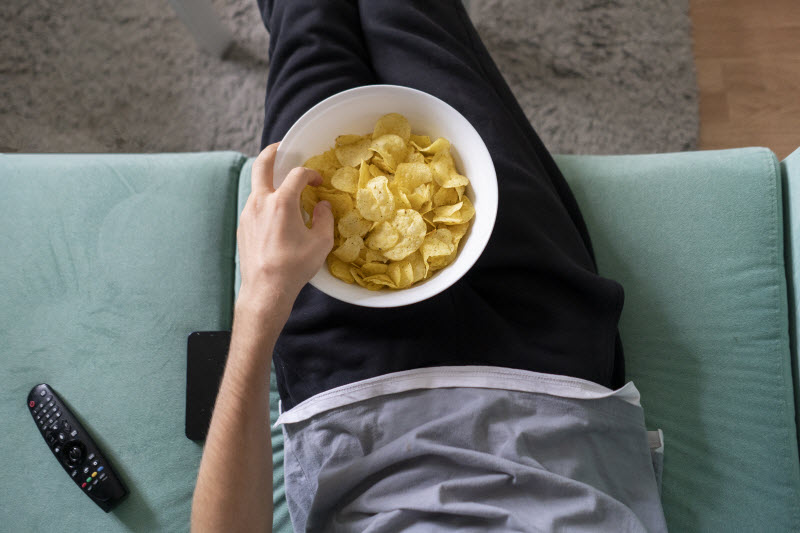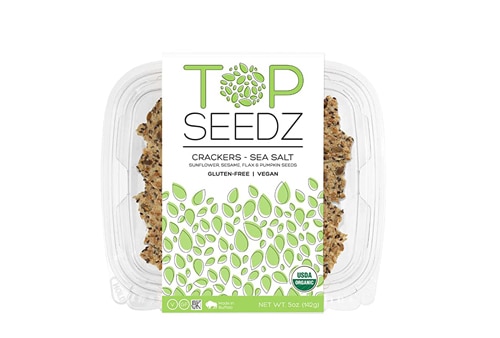[vc_row][vc_column][vc_column_text]It doesn’t make sense to eat
healthful meals -- salads, lean meats and whole grains -- only to destroy that good work by sneaking potato chips and wolfing down bowls of ice cream.
Unfortunately, millions of people do just that.

One-quarter of people who eat healthful meals undermine their efforts by indulging in snacks that are bad for their health, according to a study recently published in the European Journal of Nutrition.
About 95% of people snack, and the average person takes in 25% of their daily calories through snacking, according to the researchers.
The researchers say popular unhealthful snacks that boost calorie intake the most are:
- Cakes and pies
- Breakfast cereals
- Ice cream and frozen dairy desserts
- Donuts and pastries
- Candy
- Cookies and brownies
Consuming these unhealthful snacks can have serious consequences for your blood sugar levels and body weight.
The researchers say there is a
link between poor snack choices and elevated body mass index, increased visceral fat mass and higher triglyceride concentrations in the period following meals.
All of these factors have been associated with metabolic disease such as stroke, cardiovascular disease and obesity, the researchers note.
Lindsay Cohen, a Missouri-based registered dietitian nutritionist and founder of
ABC Nutrition Solutions, says she commonly sees people making poor snacking choices.
“People often snack mindlessly and do not realize how much they have consumed, and end up overeating,” she says.
The worst snacks – and why they are bad
The worst snack foods are processed foods such as chips, baked goods and candy, Cohen says.
“These foods are generally high in unhealthy fats, sodium, sugar and calories,” she says. “They are also low in fiber and protein.”
Chrissy Arsenault, a Colorado-based registered dietitian at
Athletic Muscle, says sugary snacks such as candy, sugary drinks and pastries can contribute to weight gain, dental problems and blood sugar imbalances when they are consumed in excessive amounts.
She adds that eating fried and greasy snacks also can be bad for your health.
“Foods like fried potato chips and fast-food items are high in unhealthy trans fats and saturated fats, which can raise cholesterol levels and increase the risk of heart disease,” she says.
Snacks high in sodium – including salted nuts, which otherwise can be healthful – also can contribute to health issues.
“Many convenience store snacks can contain excessive sodium, contributing to high blood pressure and water retention,” Arsenault says.
Why people make poor snack choices
Emotions often play a strong role in why we make poor snack choices, Arsenault says.
“Even individuals who eat nutritious meals may experience cravings or emotional triggers that lead them to choose less healthy snacks,” she says.
Stress, boredom, or specific cravings for comfort foods can override the desire for healthy options, she adds.
In addition, unhealthy snacks are often more readily available and require less preparation than healthier alternatives.
“People might reach for convenient, pre-packaged snacks out of sheer convenience, especially when they're on the go,” Arsenault says.
Social influences can play a role in poor snack choices. Arsenault notes that at many gatherings, it can be difficult to find good snack options. "People may succumb to the temptation of indulgent options in social settings," she says.
Sometimes, poor snack choices can be hidden in habitual behaviors, says Vanessa Imus, a registered dietitian nutritionist and founder of
Integrated Nutrition.
“Here in the Pacific Northwest, we heavily rely on coffee to get us through the gray days,” she says. “For a lot of people, this means a mid-afternoon pick-me-up that comes in the form of a drink consisting of sugar, sugar, sugar, milk and coffee.”
How to choose the best snack food
It’s important to note that snacking itself is fine so long as you choose the right foods.
“Snacks should really be another opportunity to fuel your body with nutritious foods, just in smaller amounts,” Imus says.
Although it is easy to fall into poor snacking habits, a little planning and determination can help you reverse those counterproductive routines.
Eating something every two to three hours can prevent you from getting overly hungry, which can help you avoid both strong cravings for less healthy foods and overeating at meal time, Imus says.
She suggests trying to incorporate a fruit or vegetable with every snack to ensure you get fiber and antioxidants.
“You need to have
planned snacks,” Imus says. “That means you need to portion out single servings of nuts, fruit, jerky, yogurt, hummus, veggies.
Having these foods readily available between meals can keep you from overindulging in the wrong foods.
“Stock your purse, your backpack, your car, or your desk drawer with ready-to-eat snacks so you're never tempted by the breakroom doughnuts,” Imus says.
Cohen suggests always trying to combine both protein and produce in your snacking. “This will ensure that it is satisfying and contains healthy nutrients,” she says.
Examples of healthful snack choices that she suggests include:
- An apple with peanut butter
- Whole grain crackers with cheese
- Greek yogurt with berries
Arsenault says one of the simplest ways to keep snacking on track is to choose minimally processed snacks such as fruits, vegetables, nuts and yogurt.
“These foods provide essential nutrients, fiber and sustained energy,” she says.
Watching portion sizes also is important. "Use small bowls or containers for snacks to help control portions," Arsenault says.
Sometimes, thirst can be mistaken for hunger, Arsenault says. Drinking water throughout the day can keep you properly hydrated. So can eating water-rich snacks such as cucumber or watermelon.
Finally, Arsenault recommends practicing mindful eating. "Pay attention to what you're eating, savor each bite, and avoid mindless snacking in front of the TV or computer,” she says.[/vc_column_text][/vc_column][/vc_row][vc_row][vc_column][vc_text_separator title="Featured Products" border_width="2"][vc_row_inner equal_height="yes" content_placement="middle" gap="35"][vc_column_inner width="1/3"][vc_single_image image="169294" img_size="full" alignment="center" onclick="custom_link" img_link_target="_blank" css=".vc_custom_1696893614358{padding-right: 7% !important;padding-left: 7% !important;}" link="https://www.vitacost.com/late-july-organic-salsa-mild"][/vc_column_inner][vc_column_inner width="1/3"][vc_single_image image="169293" img_size="full" alignment="center" onclick="custom_link" img_link_target="_blank" css=".vc_custom_1696893630671{padding-right: 7% !important;padding-left: 7% !important;}" link="https://www.vitacost.com/jacksons-non-gmo-sweet-potato-chips-made-with-premium-coconut-oil-carolina-bbq"][/vc_column_inner][vc_column_inner width="1/3"][vc_single_image image="169292" img_size="full" alignment="center" onclick="custom_link" img_link_target="_blank" css=".vc_custom_1696893647576{padding-right: 7% !important;padding-left: 7% !important;}" link="https://www.vitacost.com/doctor-in-the-kitchen-flackers-flax-seed-crackers-cinnamon-and-currants"][/vc_column_inner][/vc_row_inner][/vc_column][/vc_row]
 One-quarter of people who eat healthful meals undermine their efforts by indulging in snacks that are bad for their health, according to a study recently published in the European Journal of Nutrition.
About 95% of people snack, and the average person takes in 25% of their daily calories through snacking, according to the researchers.
The researchers say popular unhealthful snacks that boost calorie intake the most are:
One-quarter of people who eat healthful meals undermine their efforts by indulging in snacks that are bad for their health, according to a study recently published in the European Journal of Nutrition.
About 95% of people snack, and the average person takes in 25% of their daily calories through snacking, according to the researchers.
The researchers say popular unhealthful snacks that boost calorie intake the most are:



